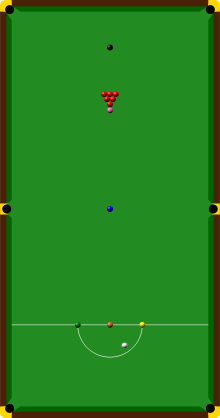Six-red snooker

Six-red snooker (sometimes spelled six-reds, 6-red, and also known as super 6s), is a cue sport based on snooker, but with only six red balls on the table as opposed to the standard fifteen. All other rules are unchanged, meaning that foul shots are more significant to the overall score. The table is the same size as in the traditional 15-red game. The format was designed to feature shorter frames, due to fewer red balls.[1] Other formats are being considered as well.[1]
This format is hoped to revive the popularity of snooker as a spectator sport, in the same way Twenty20 has done to cricket.[2] Jimmy White has said that six-red snooker could be one way of helping boost the game's popularity.[3] Ali Carter has also said he would be interested in playing the format.[4]
The first international tournament in this format was contested in July 2008, with Ricky Walden defeating Stuart Bingham in the final. A six-red tournament was held during the 2009 World Snooker Championship as a sideshow, involving one-frame knockout matches. In the final veteran Tony Knowles defeated 13-year-old Ross Muir 52–18.[2] Tickets were initially free; however, future events would have been pay-to-enter.[5] The first world championship was held in Ireland between 15–18 December 2009. Mark Davis beat Mark Williams 6–3 in the final, becoming the first world champion of the six-red snooker format.[6]
References
- ↑ 1.0 1.1 "World Snooker chief rejects claims of the sport's demise". London: Sport Revue. 13 April 2009. Retrieved 3 May 2009.
- ↑ 2.0 2.1 "Knowles is crowned Super 6 king". BBC Sport. 23 April 2009. Retrieved 3 May 2009.
- ↑ "'Super6s' can be future of snooker - White". BBC Sport. 12 April 2009. Retrieved 3 May 2009.
- ↑ "CARTER FEELS LIKE A CONTENDER". Sporting Life. Archived from the original on 16 July 2011. Retrieved 3 May 2009.
- ↑ "Snooker starlet Ross Muir beaten by veteran Knowles in exhibition challenge". Daily Record. 23 April 2009. Retrieved 3 May 2009.
- ↑ "Davis makes his Mark in Killarney". Global Snooker. 18 December 2009. Archived from the original on 6 July 2011. Retrieved 18 December 2009.